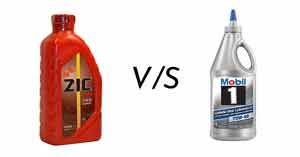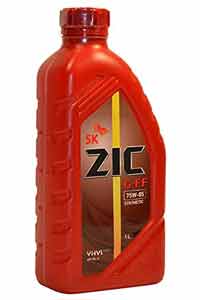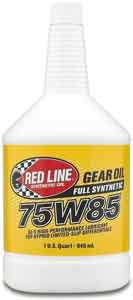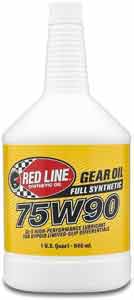75w85 vs 75w90 Gear Oil
There is a lot of confusion surrounding the difference between 75w85 vs 75w90 gear oil, so in this article, I will cover all of the key differences, including how they’re different in regards to viscosity, compatibility with different oils and fluids, and performance.

Difference between 75w85 vs 75w90 Gear Oil
| 75w85 | 75w90 |
| Lower viscosity | Higher viscosity |
| Poor stability and performance | Better stability and performance |
| Poor heat resistance | High heat resistance |
| Good | Good |
1. Viscosity
The difference in viscosity between 75w85 and 75w90 gear oil is the thickness of the oil at low temperatures. These two types of gear oils have a cold cranking rating but are different. A lower viscosity generally means the oil will flow at a lower rate while in motion.
Thicker oils will flow slower, which allows them to lubricate better under colder weather conditions or when there are fewer moving parts.
2. Performance
These oils are very much alike as far as performance is concerned. Both have high load capacity and flow at extremely high temperatures. Oils 75w85 and 95w90 have been manufactured by the same companies, making them a perfect match for almost any standard gearbox.
3. Heat resistance
The 75w90 oil will perform better in hot and cold conditions because of its high viscosity. Comparing these two oils shows that 75w85 is slightly thicker and has a lower boiling point than 95w90. They both deal with very similar pressures, and they have similar wear characteristics.
75w85 Gear Oil
75w85 oil is a thinner, better-flowing gear oil. This type of oil is suited for colder weather. The 85w rating refers to the oil’s viscosity when it heats up. It behaves more like a thicker, viscous oil when cold and thin like other standard oils when hot. This is why it is called an “all-season” gearbox oil.
1. Zic 75W-85 gear oil
Zic 75w-85 is made by CITGO. It is used in the Toyota 2JZ-GTE engines. It has an additive package designed to resist petroleum-based fuel and not break down or coke up when running a high-boost turbo like the GT28RS or GT2871R. It has a very thin consistency at 50°C / 122 °F and is typically used for drag race cars that make more than 1000hp.

Features
- The CITGO 75W-85 oil has been engineered to resist the breakdown of conventional and fuel-resistant additives.
- It is a premium-grade oil that uses standard mineral and synthetic base oils in a unique additive package
- Provides excellent cold start protection and resistance to carbon build-up at high operating temperatures.
- It is formulated to meet or exceed the requirements of OEM components.
Read More About Black chrome vs Gloss black
2. Red Line 75W85 Gear Oil
This synthetic gear oil is made in England. It is a lighter, thinner oil that flows better than older-style 75w90 gear oil. Not only does it flow better and lubricate faster, but it also resists water, sludge, and other contaminants better. This lightweight gear lube works best in short-throw shifters like those found on a Honda S2000 or Mini Cooper.
Features
- Low Ash content – up to 6%
- Thick and viscous oil flows better at winter temperatures 75w85 gear oil is ideal for cold climate applications.
- Although it is not intended for high-performance applications, this less-viscous
- high-viscosity gearbox lube should be used with care in
- High-performance applications where thicker viscosity oils are typically used. Excessive Pressure at the bearings can cause the oil to break down and/or attract water.

Is it OK to use 75w90 instead of 75w85?
Yes, it is. Like many things in life, there is a fine line between using too much and not enough. Using more than your required oil level too often can cause it to harden and lose its ability to flow efficiently.
Too often, using less than your required oil level can cause a bearing or gearbox to run dry and wear quickly. This is why manufacturers recommend only 50% more oil than their recommended level.
What is 75w85 gear oil used for?
75w85 is a standard gear oil slightly thicker than a 95w90 gear oil. It is used in heavy-duty automotive and industrial applications. The recommended viscosity for 75w85 gear oil is SAE J300 at 100C, while the recommended viscosity for 95w90 gear oil is SAE J320 at 100C.
Can I use 75w85 instead of 75w80?
Yes, 75w85 can be used as a substitute for 75w80. There is not much difference between 75w85 and 75w80. The only difference is the viscosity of the oils. In most cases, 75w85 can be used as a substitute for 75w80.
Is Toyota 75w85 gear oil Synthetic?
Yes, all Toyota gear oils are synthetic. They are formulated to meet the demands of Toyota’s engines, transmissions, and other high-performance components. All of our synthetic oils are blended and formulated by NAPA Auto Parts.
75w85 gear oil substitutes
You can also use 75w40, 75w90, 75w140, and other synthetic oils in your Toyota. All of our synthetic oils are blended and formulated by NAPA Auto Parts.
75w85 gear oil is sulfur-free and certified for use in all climates. It is formulated to meet the demands of Toyota’s engines, transmissions, and other high-performance components. The viscosity of 75w85 gear oil also makes it a better choice than 5W-30 or similar grades.
Toyota 75w85 equivalent
75w85 could be considered an alternative to 75w80. The only difference is the viscosity of the oils. Discussions with Toyota have revealed that 75w85 oil can be substituted for 75w80 at any time since there is so little difference between them.
75w85 gear oil Valvoline
Valvoline offers the consumer a synthetic blend of 75w85 oil. Their products are formulated with the exclusive technologies of Valvoline. Valvoline has been producing high-quality synthetic oils since 1957 and offers superior products to its customers.
There are many misconceptions about synthetic and mineral-based oils. The main difference between the two is that synthetic oils do not contain impurities or chemical residues like mineral-based oils.
On top of that, synthetic oils provide better engine performance, wear protection, and friction reduction. Synthetic oil is quite a bit more expensive than its mineral counterpart, but the benefits for your vehicle outweigh the initial cost.
75w 85 vs 75w 14
The main difference between 75w85 and 75w 14 is in performance. Synthetic oils are formulated to meet the demands of your car or truck’s engine, even under extreme conditions.
The viscosity of 75w85 oil prevents it from getting too thin when temperatures rise outside of normal operating ranges. This ability causes the oil to provide better lubrication for your car or truck’s engine for a longer period.
Can I use GL5 instead of GL4?
No, it is not recommended to use GL4 instead of GL5 oil. The API chemistry code for 75w85 oil is GL-5, but most specifications also require the ISO viscosity grade to be HTHS (High Temperature/High Shear).
In other words, it has a rated temperature of 250C and its limits are 85, 150, and 220. Most automotive lubricants have HTHS limits within API requirements.
Is 75w140 better than 75W90?
75w140 gear oil will provide better protection for your car or truck than 75w90. The flow properties of 75w140 gear oil will allow it to work better in cold weather and pump more easily.
What differential oil does Toyota use?
Toyota has a variety of different differential oils. The oil used in the rear differential is specifically developed to lubricate and protect the gears, bearings, and other components. Toyota recommends using 0W40 – 10W40
Can I use ATF as diff oil?
No, you can not use ATF in a rear differential. ATF is formulated specifically for the front differential. It will not flow through the gears or operate properly in the rear differential.
What is the viscosity of the Toyota 75w90 gear oil?
Toyota’s 75W90 gear oil viscosity is SAE J400 at 100C and SAE J600 at 150C. This allows for a higher temperature rating for less engine damage and premature wear risk.
Can I use 75w140 instead of 75w90?
Yes, in most cases, you can use 75w140 instead of the recommended 75W90. The viscosity of the oils is almost identical. There may be some performance improvements between the two oils. You will want to check with your source to ensure that you use a high-quality, reliable product in your transmission.
How often does differential fluid need to be changed to Toyota?
Every 40,000 to 60,000 miles. Toyota recommends fluid replacement to ensure the differential is well-lubricated and contaminant-free.
What gear oil should I use in my differential?
Toyota recommends using Valvoline SynPower 75W-90 gear oil. Valvoline offers the consumer a synthetic blend of 75w90 oil. Their products are formulated with the exclusive technologies of Valvoline. Valvoline has been producing high-quality synthetic oils since 1957 and offers superior products to its customers.
What happens if you use the wrong differential fluid?
Using the wrong differential fluid can cause premature wear and damage your rear end. Toyota recommends using only Valvoline Synpower 75W-90 synthetic gear oil. Their lubricants offer the versatility of being a synthetic or mineral-based oil.
How often should you change the differential fluid in your Toyota 4Runner or Tundra?
Every 40,000 to 60,000 miles. Toyota recommends fluid replacement to ensure the differential is well-lubricated and contaminant-free. One of the main reasons Toyota recommends replacing your transmission fluid is to reduce the chance of internal gearbox damage caused by the contaminated lubricant.
What does a dry differential sound like?
A dry differential will make a clicking or gear grinding. The sound will be louder when the transmission is in gear and quieter when the vehicle is in Neutral or Park.
What are the symptoms of low rear differential fluid?
Some of the symptoms that your rear differential oil is low are:
- Clicking noise when in gear
- Leaking from the transfer case seal
- Difficult to shift gears
- Rattling or grinding in gear
- Loss of drivability.
How often should the differential fluid be changed?
Toyota recommends changing the differential fluid every 30,000 to 60,000 miles. Regular maintenance is required to ensure that the front differential is well-lubricated and contaminant-free.
75w90 Gear Oil
Valvoline has a synthetic blend of 75w90 formulated for the Toyota Tundra. Their products are formulated with the exclusive technology of Valvoline. Valvoline has been producing high-quality synthetic oils since 1957 and offers superior products to its customers.
Valvoline does not recommend taking the Toyota Tundra out of gear for extended periods. Otherwise, you may damage your gear. In some cases, this can take up to 2 hours to remove enough water to change the rear differential fluid.
1. Mobil 75W-90 Gear Oil
This gear oil is excellent for applications where ambient temperature can go as low as -40°F (-40°C). It provides a better viscosity index and lowers pour point than the Mobil 75W-80 Gear Oil.
This gear oil is ideal for applications where the operating temperature will not be below freezing. It provides an improved viscosity index and resistance to foaming compared to our 95 series oils.
Features
- Excellent high-temperature performance (temperatures -40°F ~ 125°F)
- Excellent resistance to foaming
- Improved viscosity index and pour point with low-freezing temperatures

Applicable for:
- Pump engines, Transmission applications, Marine applications, Industrial and agricultural applications.
- We always recommend using our Mobil service bulletin for the most current information regarding your vehicle.
- For transmission vehicles in particular, please see our Mobil Service Bulletin Transmissions: Recommended Oils & Lubricants.
2. Red Line 57904 Gear Oil
is a gear lubricant made by Red Line that offers two different viscosity grades, 75w80 and 75w90? The 80 weight is designed for smaller gears.
75w90 gear oil can be used for heavy-duty operations with high loads, speeds, and temperatures. It should not be used in transmissions because it will cause them to leak. Finally, Red Line is a company that has been producing automotive additives since 1949 with a focus on providing consumers with the best possible products and services.
Features
- Ultra-high viscosity index for maximum film strength and oxidation resistance.
- Low pour point for use in both extreme cold and hot temperatures.
- Superior wear protection against scoring and scuffing in both open and enclosed gears.
- Does not contain friction modifiers, which increases debris and contamination levels in the gear oil. They can also promote fluid breakdown at high temperatures, especially within limited-slip differentials.

Read Also Jeep grand cherokee ivory tri coat vs Bright white
What does 75W90 mean?
75W90 can mean one of two things:
A gear oil with a blend of 5-30W (75W) and 30-80W (90W) or A wiper fluid with 75% alcohol and 15% ethylene glycol base.
What is 75w90 gear oil used for?
75w90 synthetic gear oil is used in 5 different applications:
Honda V-Tec Transmissions (variably geared transmissions), Mercedes VarioGear Transmissions (variably geared transmissions), BMW Transmissions Land Rover Discovery Series II Transmission Audi VariGear Transmission, Volkswagen VariGear Transmission Toyota V-Tec Transmission – Lexus LS400, GS400
What is the difference between 80w90 and 75W90?
75w90 gear oil is formulated to provide the following features:
Better high-temperature performance, Reinforced components for high temperatures, higher load, and extended drain intervals, Superior gear protection for all operating ranges High resistance to wear (minor metal-to-metal contact)
75W90 gear oil has a higher pour point than 80W90. A higher pour point means it will not pour as easily as lower pour point oils when it gets down to low temperatures but will still flow well at low temperatures.
FAQs
Is 75W90 suitable for manual transmission?
Yes, 75W90 is a very good choice for manual transmissions used regularly in hot conditions. Manual transmissions tend to be very susceptible to bearing wear in hot conditions, so the higher viscosity of the 75W90 gear oil should help extend the service intervals of these transmissions.
Can I use a 75W-90 gear oil instead of a 75W 85?
Yes, but it is a slower-drying oil. In general, you should use an oil with the same viscosity as your 75W-90 gear oil to get the high-temperature performance of the 75W-85. For example, if your transmission doesn’t need an 80W-90 gear oil, use a 75W-85 instead.
75w90 viscosity
75W90 is the same viscosity as 75W85, just formulated differently. 75W90 gear oil has a viscosity similar to the following oils: 75w75 10W100 10W95 10W80 15w20 80w80 20w40 40wt40 40SCF50 80SCF50 40SCF50 SAE30 SAE40 SAE45 80X60SAE45 20x60SAE45 5x87SAE50 235w85 5.2 x 86.3 5.
Is it OK to use 75w90 instead of 75w85?
Yes. It is fine to use 75W90 instead of 75W85. Using a lower-viscosity oil will result in a slightly slower-drying oil and lower heat resistance.
Is 75w140 better than 75W90?
No. There is no point in using 75w140 or 75W140 because it’s the same viscosity as 75W85. The use of a lower-viscosity oil will result in a slightly slower-drying oil and lower heat resistance
Cold Test -30 ° C 75W80, 75W85, 75W90, 80W90 GL-4, 80W90 GL-5
Conclusion
At the end of the day, if the truck is still running smoothly, then you are probably doing just fine. The best thing to do is try to keep your truck maintained and up-to-date with new parts and different fuels.
Internal combustion engines such as diesel trucks benefit from experimenting with various lengths of engine oil life – 75w85 vs 75w90 – as opposed to sticking with one type of oil for a long time like you might have in a ca